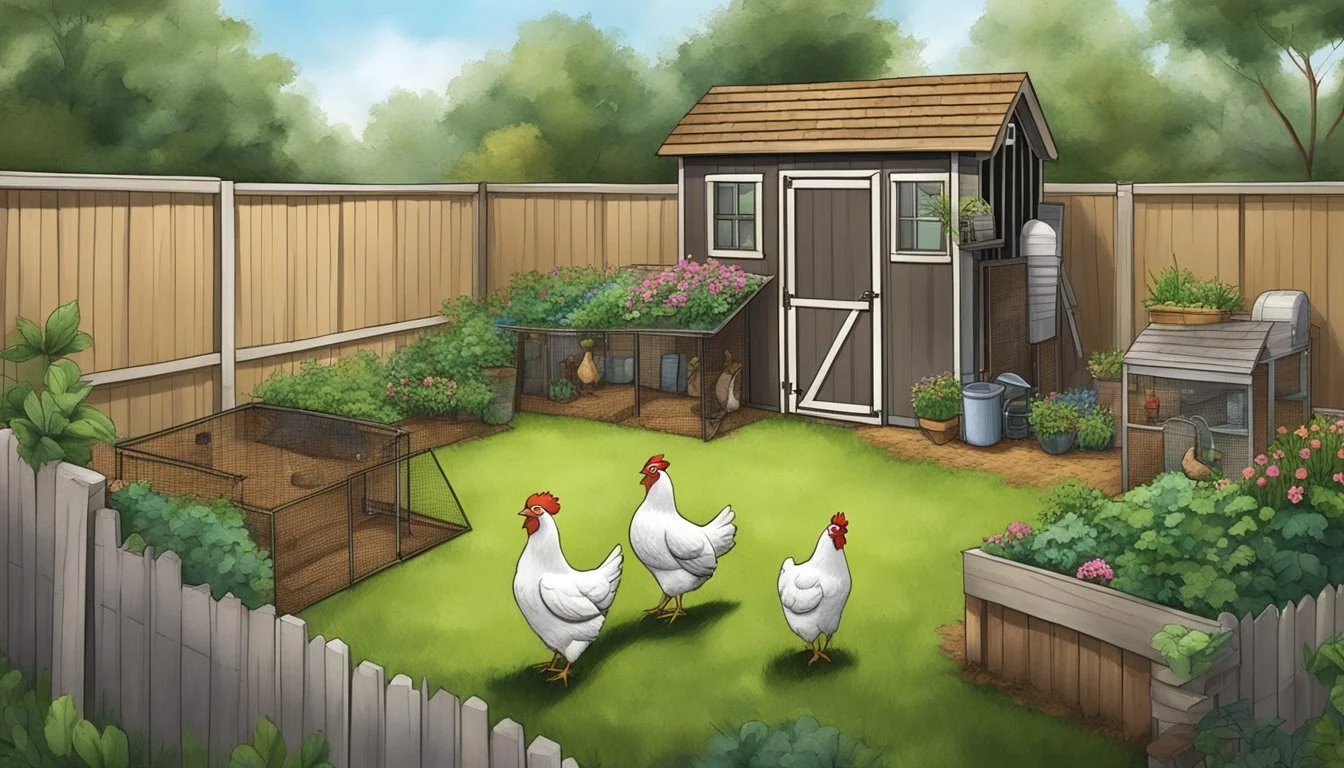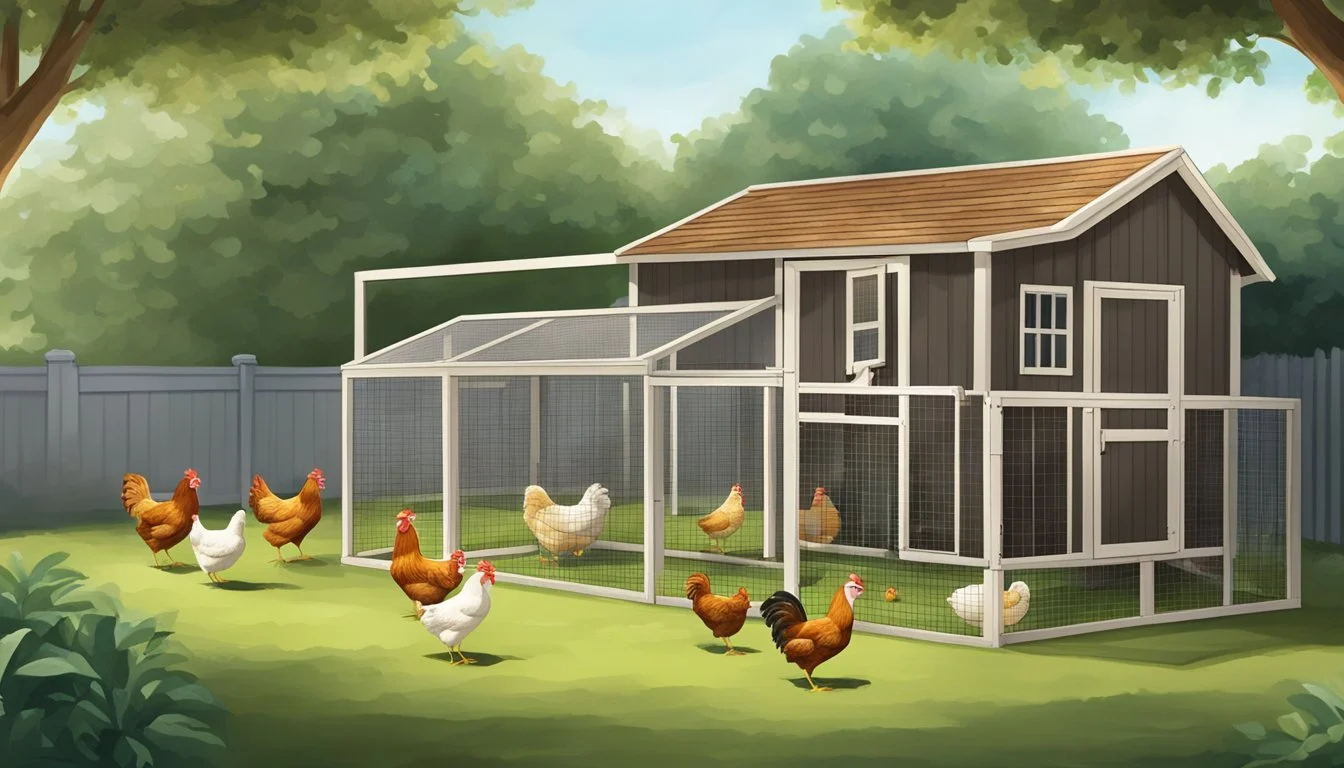Keeping Backyard Chickens in Houston, TX
Essential Tips for Urban Poultry Farming
Raising backyard chickens has gained popularity in Houston, Texas, as residents seek more sustainable and self-sufficient lifestyles. Understanding local ordinances is crucial for potential poultry keepers. Houston's Code of Ordinance outlines specific regulations to ensure that keeping backyard chickens is done in a manner that respects the wellbeing of the animals, as well as the community’s peace and safety.
The city allows residents to keep a maximum of 30 chickens, but roosters are not permitted due to noise considerations. Essential to compliance with the city's ordinance is the stipulation that chickens must be housed within a secure enclosure. This coop must be situated at least 100 feet away from any neighboring dwelling, church, school, or hospital. Accessibility to the animals, maintaining cleanliness, and providing adequate space are pivotal to create a suitable environment for the chickens. Each bird should have a minimum of two square feet of space, highlighting the city's commitment to animal welfare.
Houston's approach to backyard chickens reflects a balance between urban living and agricultural interests, allowing residents to partake in the age-old practice of poultry-keeping while adhering to contemporary urban standards. The regulations have been crafted to mitigate nuisances and health risks, enabling Houstonians to enjoy the benefits of fresh eggs and the pleasures of caring for chickens, without compromising the rights of nearby residents.
Legal Aspects of Raising Chickens
In Houston, Texas, city ordinances dictate specific regulations for residents interested in raising backyard chickens. Knowing these laws is crucial to ensure compliance and avoid penalties.
Understanding Houston's Chicken Ordinances
Houston’s city ordinances permit residents to keep up to 30 chickens, with the explicit rule that no roosters are allowed. Key stipulations in the ordinance require:
The chickens must be kept in a secure enclosure.
Said enclosure must be at least 100 feet away from any neighboring residences.
Failure to adhere to these stipulations may result in fines or other penalties, emphasizing the importance of compliance for those planning to raise chickens within city limits. Moreover, residents should be mindful of any additional restrictions that may be imposed by their Homeowners Association (HOA), as these can sometimes have more stringent rules.
Permit Requirements for Keeping Chickens
When raising chickens in Houston, it is generally not required to obtain a special permit; however, standard guidelines for enclosures and distance from other residences still apply. Residents must ensure:
Compliance with the 100-foot rule for coop placement from neighboring homes.
Proper maintenance of enclosures to avoid nuisances or health hazards.
It is essential for individuals to consult with local authorities or the city’s planning department to confirm there have been no updates to local laws that might affect their chicken-keeping practices. It is also wise to periodically review these ordinances, as any changes could impact legal requirements or the allowable number of chickens.
Selecting Your Backyard Chickens
When starting a backyard flock in Houston, picking suitable chickens is crucial, considering breed qualities and determining the flock's composition.
Choosing the Right Chicken Breeds
The selection of chicken breeds should be based on climate adaptability, egg production, and temperament. In the warm Houston climate, heat-tolerant breeds like Leghorns, Rhode Island Reds, and Australorps thrive. These breeds also have the benefit of being prolific egg layers, laying on average between 200 to 300 eggs per year. For those seeking a docile breed, Orpingtons are known for their friendly nature.
Determining the Number of Hens and Roosters
Houston ordinances allow up to 30 chickens, but roosters are prohibited due to noise considerations. A flock composed entirely of hens will ensure compliance with local laws and avoid potential disputes with neighbors. A standard backyard flock size can range from 3 to 10 hens, depending on the space available and the owner's capacity to provide adequate care. It's important to maintain a coop with at least 100 feet of distance from any neighboring homes to adhere to the city's regulations.
Designing a Chicken Coop
When constructing a chicken coop in Houston, attention must be given to space efficiency and security to ensure a healthy environment for the chickens.
Coop Size and Location
The appropriate size for a chicken coop in a Houston backyard must provide a minimum of 4 square feet of floor space per bird inside the coop. Space allocation is crucial to prevent overcrowding and maintain healthy living conditions. For outdoor run areas, 10 square feet per chicken is recommended. The coop should be situated in a part of the garden that allows for adequate sunshine and shade, with consideration for local ordinances requiring that poultry enclosures be kept a certain distance from human dwellings.
Ventilation is another vital factor, with a minimum of 1 square foot per bird suggested for moderate climates and up to 2-3 square feet in the hotter Houston climate. Properly positioned vents or windows can efficiently regulate airflow and temperature.
A coop's location also needs to prioritize safety from flooding, which means it should be placed in a higher elevation within the garden or backyards to prevent water accumulation. Additionally, consider ease of access for feeding, cleaning, and egg collection when deciding on the coop's placement.
Creating a Secure Enclosure
A secure enclosure is non-negotiable to protect chickens from predators and environmental factors. The walls and roof of the chicken coop should be constructed with sturdy materials resistant to weather damage and predator intrusion. Fencing for the run area should extend underground to prevent digging predators from entering.
The coop should feature a combination of solid walls and wire mesh to provide security and ventilation, without compromising on either aspect. Locking mechanisms on doors and access points are essential to keep chickens safe.
In summary, a well-designed chicken coop for Houston backyards combines appropriate sizing, strategic placement, and fortified construction to create a safe, comfortable environment for backyard chickens.
Chicken Health & Welfare
Maintaining the health and welfare of backyard chickens involves a dedicated approach to nutrition, protection, and disease prevention. Proper feeding, safeguarding against predators, and mitigating illnesses are crucial.
Feeding and Nutrition
Chickens require a balanced diet to stay healthy. They typically consume a mix of:
Commercial feed: Providing complete nutrition designed for different stages of life (starter, grower, layer).
Grit: Essential for digestion, often found naturally as chickens peck the ground.
Calcium supplements: Like oyster shells, to strengthen eggshells and bones.
Chickens should have continuous access to clean, fresh water.
Predator Protection and Exercise
Exercise is important for chickens, both for their physical health and to prevent behavioral problems. Adequate space to roam safely allows for:
Natural behaviors: Such as scratching, foraging, and dust bathing.
Predator protection: Coops and outdoor runs should be fortified with:
Protection Method Description Secure fencing To deter digging and climbing animals Covered runs To protect from aerial threats Locking mechanisms For nighttime safety against intruders
Disease Prevention
Disease prevention in poultry involves:
Sanitation: Regular cleaning of coops to prevent the buildup of waste and reduce the risk of infection.
Vaccination: Where recommended, against common illnesses.
Veterinary care: Regular check-ups to catch health issues early.
Owners should watch for any sign of illness, such as changes in behavior, appearance, or drop in egg production. Addressing issues promptly fosters a thriving flock.
Daily Care and Maintenance
Keeping backyard chickens requires a commitment to daily care and maintenance to ensure the health and safety of the poultry. This involves routine cleaning, waste management, and proper egg handling within their enclosures.
Cleaning and Waste Management
Daily inspection and cleaning of chicken coops is crucial. Owners must remove droppings and refresh bedding materials to maintain hygiene. Enclosures should be designed with ease of cleaning in mind, possibly with removable trays or floors to facilitate waste removal. Here's a recommended schedule:
Daily: Remove droppings and leftover food.
Weekly: Change bedding and inspect for signs of pests or damage.
Waste should be collected in a fly-tight container and disposed of or composted according to local regulations.
Egg Collection and Storage
Eggs need to be collected from the pens frequently to ensure they are clean, fresh, and safe for consumption. Ideally, eggs should be collected at least once a day. Fresh, unfertilized eggs do not require refrigeration immediately but should be stored in a cool, dry place if not used right away. Once washed, they must be refrigerated to maintain freshness. Implement this process for handling eggs:
Collection: Gather eggs using a clean basket or container.
Cleaning: Wipe off any dirt with a dry cloth or sandpaper. If needed, briefly wash with warm water and dry immediately.
Storage: Store unwashed fresh eggs at room temperature for several days or refrigerate if washed or for longer storage.
Regular collection and proper storage are key to maintaining a steady supply of healthy, unfertilized eggs from your backyard flock.
Community Relations and Educational Value
Keeping backyard chickens in Houston not only provides families with fresh eggs but also offers educational opportunities for both children and adults alike. It fosters a sense of community when neighbors engage in thoughtful communication and shared learning experiences.
Communicating with Neighbors
In Houston, residents must house their chicken coops at least 100 feet away from neighboring homes, churches, or schools to minimize potential nuisance. It's imperative that chicken keepers proactively discuss their plans with neighbors to address any concerns. Effective communication strategies may include:
Offering educational resources about backyard chickens.
Discussing how noise and odors will be managed.
Providing specifics about coop design and maintenance.
Including Family and Neighborhood in Chicken Keeping
Chicken keeping can be a rewarding family activity that offers hands-on education about animal care, local agriculture, and responsibility. Families can extend this educational experience to the neighborhood, utilizing it as a resource to foster community engagement. Actions they can take involve:
Organizing community meetings to share best practices.
Creating a neighborhood coop tour to educate on humane and sanitary chicken upkeep.
Sharing surplus eggs to highlight the benefits of local food resources.
By involving one's family and neighborhood in chicken keeping, Houston residents contribute to a well-informed and cooperative community.
Local Resources and Support Networks
In Houston, Texas, individuals interested in keeping backyard chickens can access a variety of local resources and support networks. Edible Houston is an invaluable resource for urban poultry enthusiasts, offering guidance on Houston's Code of Ordinance regarding poultry keeping. This includes regulations for chickens, turkeys, geese, and ducks, emphasizing the minimum distance of animal enclosures from habitations and community buildings.
Local authorities provide clear guidelines for residents. For instance, homeowners in Houston may maintain up to 30 chickens, excluding roosters, and must house them in enclosures at least 100 feet from any neighbor's residence. Houstonians can contact the City of Houston's Health Department for detailed regulations and compliance assistance.
BackYard Chickens, an online community, has a Harris County section where Houston residents share experiences and offer advice on hen keeping, including discussions on the Texas Law that allows "6 backyard hens." It's a useful forum for interacting with fellow poultry keepers.
A uniquely supportive group based on Facebook, titled Houston Area Backyard Chickens, fosters a sense of community among poultry enthusiasts. This group is an excellent platform for sharing stories, posting pictures, and exchanging knowledge on care and legal compliance.
For the broader metropolitan areas in Texas, including Arlington, Corpus Christi, El Paso, Irving, Grand Prairie, Waco, Round Rock, Richardson, Lewisville, and Plano, it's crucial to consult with local city ordinances as backyard poultry regulations may vary.
Individuals with medical conditions requiring animal assistance can seek further guidance on keeping poultry for therapeutic reasons. Authorities typically consider such cases distinctively, ensuring that regulations are applied with accommodation in mind.






